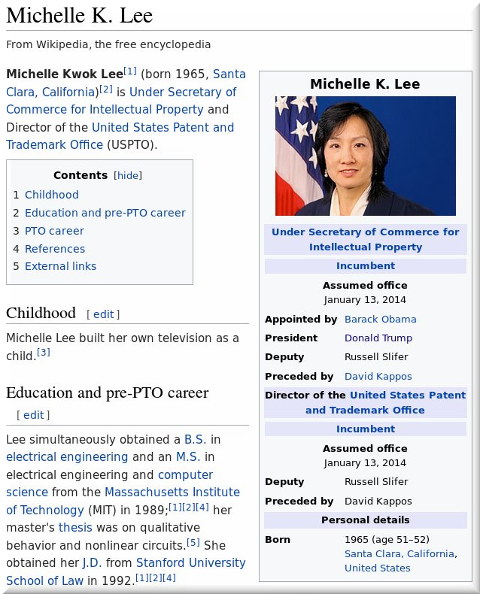

Reference: Wikipedia
THE death of software patents (in the US) is habitually and even casually being denied by those who have made a lot of money from them, notably law firms.
"Clearly, in the patent microcosm's press (like Texas Lawyer in this case), the term "most popular" means popular among trolls and lawyers."The article as a whole is behind a paywall, but the summary states: "While patent infringement filings are down both nationally and in Texas according to a recent report, there's still no question who the King of America's patent docket is: U.S. District Judge Rodney Gilstrap of Marshall."
King of the trolls maybe, now that the father of patent trolling is dead. The Eastern District of Texas and Judge Gilstrap are a farce; as we pointed out a few days ago, the Supreme Court should act fast against both, essentially by moving cases out of this "rocket docket" of patent trolls, starving the demand for kangaroo patent courts.
Writing about the latest twist in the Smartflash case, a site that promotes software patents mentioned how the Eastern District of Texas was once again overruled by CAFC. To quote:
The Federal Circuit has reversed Eastern District of Texas Judge Gilstrap’s denial of a post-trial motion for a judgment of patent-ineligibility under 35 U.S.C. €§ 101 of three patents directed to accessing and storing payment data. Smartflash, LLC v. Apple, Inc., No. 2016-1059 (Fed. Cir . March 1, 2017). Chief Judge Prost, writing for a panel that included Judges Newman and Lourie, saved Apple from a jury verdict that claims of U.S. Patent Nos. 7,334,720; 8,118,221; and 8,336,772 were valid and infringed.
As a plethora of cases demonstrates, no matter how separate the patent-eligibility is from the question of prior art in practice, the reality is that the analyses go hand-in-hand. So when drafting patent applications think hard about whether you can state a technical solution to a technical problem. And if you can state a technical problem and solution, do it, as clearly as you can.
"...Alice is here to stay and the Supreme Court has taken no other case that can reverse Alice."As usual, they ruled against these patents, as they do in the significant majority of the cases (most of the time) nowadays. Watchtroll, as expected, continues to moan about death of so many software patents (calling the software "revolutionary"), but maybe these people should just move on and get another (real) job, not lobbying for software patents and fooling developers into pursuing patents that are a waste of money.
The funniest headline we have come across? A clickbait headline from boosters software patents, asking "Goodbye Alice?"
Haha, that's a good one. No, Alice is here to stay and the Supreme Court has taken no other case that can reverse Alice. Here is what the article says, citing front group IPO (which has this new IBM-led campaign to shoot down Alice):
A recent proposal by the Intellectual Property Owners Association (IPO) to amend 35 U.S.C. ۤ 101 could bring positive change to applicants attempting to acquire patent rights for computer implemented inventions in the US.
The proposal comes after court decisions such as Alice Corp Pty v CLS Bank Int’l (2012) (Alice Corp) blurred the lines between patentability and obviousness, requiring an assessment of the “inventive concept” to be performed when evaluating subject matter eligibility of an application, and resulting in a significant number of computer-related inventions being found invalid for lack of patentable subject matter.
"Now that software patents are ebbing away so do patent trolls, which the Supreme Court might soon throw out of the Eastern District of Texas."Recently, the "Federal Circuit ruled that companies who receive patent demand letters from trolls can’t sue them in their home district," Daniel Nazer wrote for the EFF. One must remember the close correlation between software patents, patent trolls, and the Eastern District of Texas. If even the lower courts sometimes deny the Eastern District of Texas access to everyone's alleged grievances, then we might not even have to wait until TC Heartland. However, to quote Nazer, the Federal Circuit has not exactly been consistent, at least not yet (consistency will likely come after the Supreme Court issues a ruling on TC Heartland, some time later this year):
If a patent troll threatens your company, can you go to your nearest federal court and ask for a ruling that the patent is invalid or that you aren’t infringing it? According to the Federal Circuit (the court that hears all patent appeals), the answer to this question is usually no. The court has a special rule for patent owners that demand letters cannot create jurisdiction. EFF, together with Public Knowledge, recently filed a friend-of-the-court brief asking for this rule to be overturned. But in a decision this week, the Federal Circuit reached the right result for the accused infringer in the case, but left its bad law largely in place.
[...]
Second, in a case called Red Wing Shoe, the Federal Circuit ruled that companies who receive patent demand letters from trolls can’t sue them in their home district to get a determination the patent is invalid or not-infringed. As others have noted, the Federal Circuit has “gone to great lengths to deny jurisdiction over patentees sending demand letters from afar.”